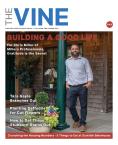Name: Brian Nelson
Nickname or alias: King
(“Because that is my middle name!”)
Profession: Engineer/musician/plumber, creator with David Sprague of Nelson Mechanical Design
Washed ashore from: D.C. by way of Boston
Years ago: 23
Job in a former life: Jazz and blues musician
Favorite spot on the Island: The stage at the Ritz or the Port Hunter
Favorite room in the house: Basement Studio
Brian Nelson grew up in Washington, D.C., but spent many a summer on Martha’s Vineyard. His grandparents—newspaper people from Iowa—had a long-distance friendship with Henry Beetle Hough, the publisher and editor of the Vineyard Gazette. After visiting Hough here, Nelson's grandparents started renting a summer shack on what is now South Beach.
So when Brian visited the Island years later with his wife, Claudia, he wasn’t totally surprised when she said, “We have to move here.”
“I understood the magic,” he said. “It’s a great place to raise kids.”
Nevertheless, this former full-time musician, who had obtained a graduate degree in mechanical engineering just so he could make a decent living, had to change his career again when he arrived here in 1984.
“I became a master plumber; and that is when I met Dave Sprague, also a master plumber and my current business partner.”
Together they created Nelson Mechanical Design in 2004, a leading designer and installer of green heating and cooling systems.
He and Claudia now have five children and live in Vineyard Haven.
Q. Why this business?
A. By 2004, we said, “You know, there is more to be offered than just boilers and plumbing systems.” We saw a huge market on the Vineyard for green technology.
Q. Why did you think so?
A. Because what we have here is the magical intersection of very knowledgeable people who are willing to pay a little bit more for systems that are efficient and green. And they are also very proud of it. They want to let their friends know.
Q. Is that unusual?
A. Yes, when we go off-Island to trade shows and talk to people, they can’t believe the concentration of savvy people we are so blessed with here.
Q. What did David Sprague bring to the table?
A. He was younger and his back was stronger! (Laughs.) Actually, at that point, he had a strong background in commercial plumbing and also in large residential projects. What I brought to the table was the engineering background and the design ability. Dave brought the installation know-how.
Q. In plain English, describe what your company does?
A. Our role is to make your home comfortable, livable, enjoyable. We do the heating, the cooling; we do the humidification, we do the dehumidification; your hot water, pool heating, anything that involves the livability of the home. And we do it with technology that is relatively cost and energy-efficient.
Q. How do you keep up with new technologies?
A. As new things come out, we now have the training and the experience to look at each and say, ‘This isn’t ready yet for our customers,’ or ‘Wow, this is great!’ We need to make sure this is a ten-year solution and not just a band-aid.
Q. Building these systems into new homes works, but what about those of us who have older homes?
A. It did appear at first that owners of older homes would be left behind. But now we can leave the boiler and hot water heater in place, and put a mini-split heat pump inside and use that for heating and cooling. On the very coldest days, you might need to turn the boiler on for a while, but you still dramatically reduce the energy cost of the older home.
Q. How much does a mini-split cost?
A. Between $5,000 and $8,000.
Q. Whoa! So still a big investment?
A. It is! For something as energy-efficient and cost-effective as this is to operate, it does require that investment. It’s a computer-driven system, so it is much more sophisticated than your dad’s oil boiler.
Q. It seems you have a vision of what the energy future of this island looks like. What is that?
A. In 2004, we thought the idea of giant fuel trucks continuing to go back and forth on the barges seemed nuts. We saw a real opportunity to be energy independent. So many people are now getting solar electric panels; and so many people are putting in heat pumps for heating and cooling and for water heaters; so we are heading for that energy independence.
Q. What excites you about being part of that?
A. What excites me is that we are going in the right direction. If you look at the rest of the world (not necessarily all of the U.S.), they are charging in this direction. I want to have a global vision where we can do the right thing. And I think that on the Vineyard, people want to do the right thing.
Q. And you see this as a possible career for others?
A. Oh yes! My son worked for me as a STEM intern this summer. He’s a junior at Martha’s Vineyard High School, and it’s very exciting to show him, ‘Hey, this is what the future should be.’ And to show him that you can make a living at this, a good living, and have a sustainable career.
And it is very exciting to be able to tell my younger staff that because of what we do, I could drop them off in Germany, Korea or Japan or any place else on the globe and they would fit in and be ready for the world stage.
Q. You also still play music with your band, Jelly Roll Horns. Why is that important?
A. Because music provides critical balance to my life. When I install or maintain a heating or cooling system, I want it to be predictable and reliable. When I play music, I want it to be spontaneous and fresh. Music and HVAC provide an awesome counterpoint that, for me, keeps both of them interesting.
Paula Lyons is a former ABC and CBS television consumer journalist who is now semi-retired. She lives in Vineyard Haven.




 1 comment
1 comment





Comments (1)
Comments